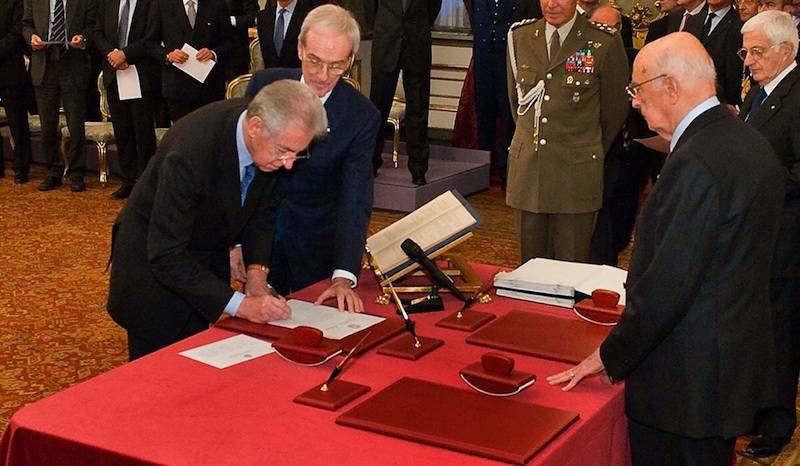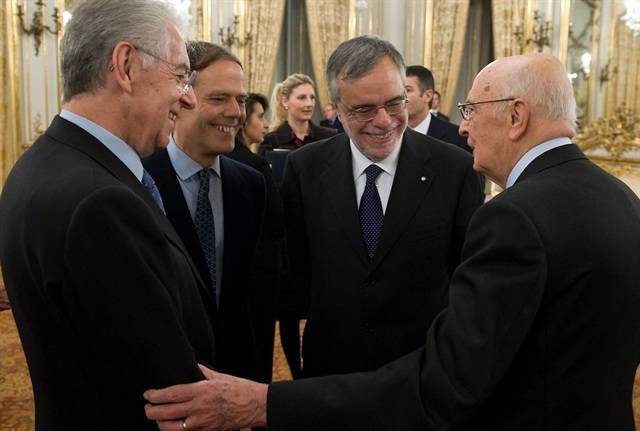Super-Sober Mario Takes Charge
ROME – They’ve dubbed him Super Mario here, after the popular video game devised by Nintendo back in 1985. The insinuation is that with a flap of his cape he can do anything, Superman style, from rescuing princesses to salvaging countries on the Brink of Bankruptcy. At the same time Premier-Designate Mario Monti (simply “Premier” when both Chamber of Deputies and Senate give him a majority vote of approval) is also constantly described in the media as Sober Mario—a man of sober habits, who wears a sober suit and sober tie, who speaks soberly, who attends Church as if he means it, who has a sober wife. who addresses problems soberly, without a wink and a wisecrack. This is a man who likes classical music and who, in the late afternoon after presenting his cabinet Tuesday, trotted over to Palazzo Venezia to view the new exhibition on the art of the early Counter-Reformation.
But moods change. Anointed by President Giorgio Napolitano to an orgy of approval and sighs of relief, he was Super Mario. Like him, his government appears amazingly strong, with support from universities, banks, big corporations and, most significantly, from the Roman Catholic Church.
For almost two decades, or since the heyday of Giulio Andreotti, the Church had been by and large eliminated from politics. Monti’s appointments include the eminent Catholic banker Corrado Passera. Strongest of the ministers, Passera will wear two hats, Development and Infrastructure. Andrea Riccardi, who will head the International Cooperation Ministry, is the founder of the prestigious Community of Sant’Egidio in 1968. This is the Catholic organization which has been running a parallel Italian and Church foreign policy, especially in developing countries. Renato Balduzzi is former president of an Catholic university graduates’ association while Culture Ministry goes to Lorenzo Ornaghi, president (rettore) of the Catholic University
Veteran Vaticanist Marco Polito calls this notable group of Catholic personalities especially significant, for they introduce a radically different political culture, in contrast with the center-right government of Berlusconi, characterized by “truculence,” “aggressive ideology” and a “heedless lack of attention to the reality of the nation.”
At the same time, as the names of his cabinet members were sinking in, Sober Mario was also raising a few hackles. Initially the big issue over his cabinet had been whether or not ex-Premier Silvio Berlusconi’s more presentable sidekick, Gianni Letta, would be named to the new cabinet so as to enhance its political clout. Monti himself had lobbied for this, but was forced to back down by Pier Luigi Bersani. The Partito Democratico (PD) objected to both Letta and another politically-colored politician, Giuliano Amato, on grounds that, like a Trojan horse, they would sneak the unhealthy old into the new. In practice, this not insignificant PD victory leaves that party solidly behind a government yet to be ratified by an election.
The Monti government is expected to last through 2013 and perhaps beyond—far longer than the babysitter or “summertime” goverments of the crises of the Seventies, which were often installed for three months. For a few, this is to usurp the authority of the electorate, which explains why a few, and not only the Silvio-nostalgics, are nervous. Bloggers were calling the Monti cabinet a “financial coup d’etat” and, from an amusing Beppe Grillo, a “coup de spread.” It is true that, although the new government requires approval of the elected Parliament, the political implications are evident. Monti was rumored as the PD candidate for Premier should early elections have been called, and today’s rumor is that the run-off for the 2013 presidential election may be between Letta and Monti. Alessandro Sallusti, editor of the Berlusconi family newspaper Il Giornale, points out that the leaders of four other parties, Bersani, Gianfranco Fini, Antonio Di Pietro and Pier Ferdinando Casini worked hard to sink Berlusconi because each hoped to profit for himself. In the end, Sallusti predicts, “the center-left may just have found the leader it was seeking, even if Bersani doesn’t know it yet.”
For the moment the goal, as stated today in the Senate, is to pay bills and promote the economy. For a savings starter, the number of cabinet slots is whittled down from Berlusconi’s 23 to just 17. Outlining his program to the Senate Thursday, again and again Monti referred to the need to bring forward two neglected resources, its young people and women; and indeed in the cabinet dubbed “the cabinet of profs” there were three women—not in the soft slots like tourism (a female post under Berlusconi), but in the sober ones, including Minister of Justice Paola Severino.
Another dash of cold water came with the official cabinet nominations. On grounds that a healthy number of bankers are included, the skeptics are claiming that it is less a government cabinet that a board of directors. In particular, there are attacks on Corrado Passera, the financial wizard who has just resigned as president of Intesa Sanpaolo to become Minister of Economic Development and Infrastructure (this will include transportation). In a reordering of the Italian postal service, Passera oversaw its downsizing by 22,000 employees.
Photos by www.quirinale.it










































i-Italy
Facebook
Google+
This work may not be reproduced, in whole or in part, without prior written permission.
Questo lavoro non può essere riprodotto, in tutto o in parte, senza permesso scritto.